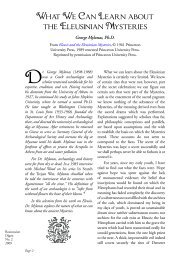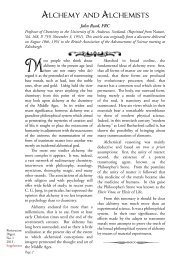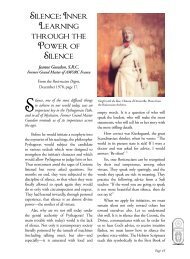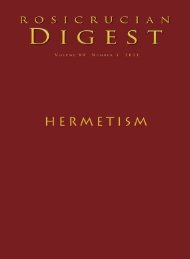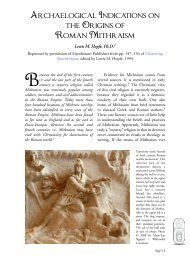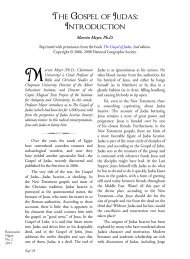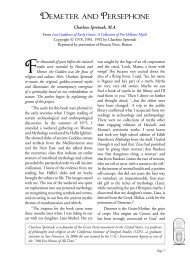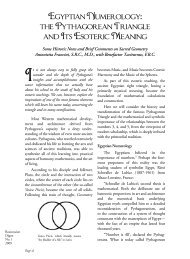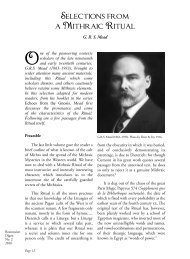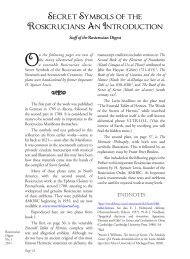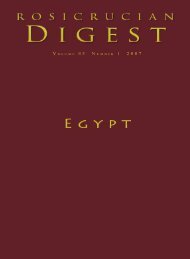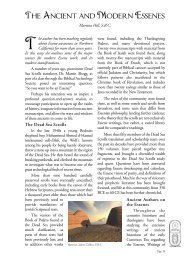The Grand Temple - Rosicrucian Order, AMORC
The Grand Temple - Rosicrucian Order, AMORC
The Grand Temple - Rosicrucian Order, AMORC
You also want an ePaper? Increase the reach of your titles
YUMPU automatically turns print PDFs into web optimized ePapers that Google loves.
Who were the Fatimids? This Arabian<br />
dynasty claimed descent from the prophet<br />
Mohammed through his daughter, Fatima, and<br />
her husband, Ali, the prophet’s cousin, who was<br />
also the fourth Caliph. This direct descent from<br />
the prophet himself gave the Fatimids high<br />
status in the Islamic world. <strong>The</strong>y were what we<br />
would term today Shi’ites, from the Arabic Shi’a<br />
Ali (<strong>The</strong> Party of Ali). <strong>The</strong>y referred to their<br />
ruler as the Imam-Caliph because he combined<br />
spiritual and political power, and the primary<br />
purpose of the new city of Cairo was to house<br />
the Imam-Caliph, his government, and army.<br />
Under the three outstanding Imam-Caliphs:<br />
al-Mu’izz (953-975), al-Hakim (996-1021), and<br />
al-Mustansir (1036-1094), Egypt became a<br />
world power. Cairo was the focal point in the<br />
east-west trade routes, linking Spain in the west<br />
to India in the east, and there were commercial<br />
contacts with the Italian city-states. In addition,<br />
the Fatimids had the only sizeable Muslim navy<br />
of the period.<br />
<strong>The</strong> arts and sciences, philosophy, and<br />
religious learning flourished in Fatimid Egypt,<br />
which had a policy of religious toleration. <strong>The</strong><br />
majority of the population were Sunni Muslims<br />
and could practice their religion quite openly,<br />
while Christians and Jews were, on the whole,<br />
well treated. <strong>The</strong> Fatimid government even<br />
entered into friendly relations with the Orthodox<br />
Christian Byzantine Empire.<br />
After the demise of the Beit al-Hikma<br />
(House of Wisdom) in Baghdad, in 991, Abu<br />
Nasr Shabur ibn Ardashir, the vizier of the<br />
Abbasid Caliph ar-Radi, founded a library, the<br />
so-called Dar al-Ilm (House of Knowledge) in<br />
al-Karkh, a suburb of Baghdad, consisting of<br />
some 10,000 books. It was probably this<br />
Fatamid tombs at Aswan.<br />
In the reign of Imam-Calip Al-Mu’izz (953-75),<br />
Fatimid fortunes reached their height.<br />
institution that served as the prototype of the<br />
great Fatimid library in Cairo.<br />
Contrary to popular opinion, when the Arab<br />
army conquered Alexandria in 641, they did not<br />
order the wholesale destruction of the famous<br />
Library of Alexandria. 1 Due to a variety of<br />
reasons, the once Great Library was no longer as<br />
important as it was a few centuries before. It still<br />
contained many books, but these seem to have<br />
been acquired by many different people, and<br />
many eventually found their way into the library<br />
of the Imam-Caliphs. Here was direct continuity<br />
from the ancient world, and after the translation<br />
of ancient books and knowledge had finished in<br />
Baghdad, it was continued in Cairo.<br />
During the 10th and 11th centuries, the<br />
Fatimid court engendered some of the liveliest<br />
theological and intellectual debates in the Muslim<br />
world. Astronomers, poets, grammarians, physicians,<br />
legal experts, theologians, and other<br />
members of the intelligentsia flocked to the capital<br />
and were given generous salaries for their creative<br />
work; much like Alexandria some 1,300 years<br />
earlier. Many philosophers were also drawn to<br />
this exciting intellectual milieu in Cairo. Among<br />
the most famous were Hamid al-Din al-Kirmani,<br />
al-Mu’ayyad fi’l Din al-Shirazi, and Nasir-e<br />
Khusraw. Some of their works are currently in<br />
print in English.<br />
On Saturday, March 24, 1005 (10 Jumada II<br />
of the year 395 of the Islamic calendar), the<br />
Imam-Caliph al-Hakim, one of the most<br />
intriguing figures in Egyptian history, officially<br />
Page 9



